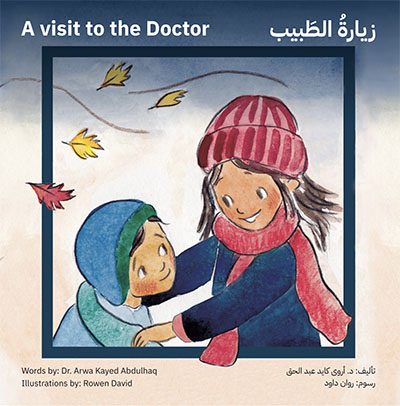Arwa Nasir, M.D., division chief of general pediatrics and associate professor in the UNMC Department of Pediatrics, has published seven Arabic-language children’s books in a series titled “We Read Together.”
Dr. Nasir, a pediatrician who is interested in research and education on the integration of mental health into pediatric practice, sees many Syrian immigrant and refugee families and has long had the goal of writing these books.
 |
Dr. Nasir’s latest book is “A Visit to the Doctor.” |
The most recent, about a little girl’s visit to her doctor, was published in November 2019, while she was on sabbatical as a Fulbright Scholar at Jordan University College of Medicine, conducting research on cross cultural pediatric mental health. The book is written in developmentally appropriate language, illustrated, and bilingual in Arabic and English, making it useful for Arabic-speaking immigrants and refugees and their children.
“She wakes up sick, goes to the doctor, and there, not only does she get treatment, but also some advice about how to stay healthy — by washing her hands, covering her cough and staying home when she is sick,” Dr. Nasir said. “A very timely message.”
“When my kids were small, growing up in the U.S., I had difficulty finding quality Arabic children’s books to read to them. My experience with my Syrian patients in the past few years prompted me to take steps and make this dream a reality.”
According to the United Nations High Commissioner on Refugees, half of Syrian immigrants and refugees are children, whose education in their first language of Arabic has been interrupted for years because of the war in their homeland.
“Many of these families and children struggle to maintain their language of origin as an important part of their culture and heritage and to maintain connection with their families of origin,” Dr. Nasir said. “Additionally, research has shown that competence in the first language facilitates the acquisition of the new language and helps with assimilation.”
A large body of evidence shows that reading to children is beneficial for language development, literacy skills and school readiness, which in turn has a positive effect on academic performance. Reading together also promotes positive parent-child interactions, which are critical for neurodevelopment and for the building of self-regulation skills.
“The American Academy of Pediatrics recommends that pediatricians promote reading to children and educate parents about the importance of literacy-promoting practices such as reading to children,” Dr. Nasir said.
The books are available at palestinepublishing.com and at The Bookworm bookstore in Omaha.

What a useful benefit you are providing to Arabic-speaking parents!